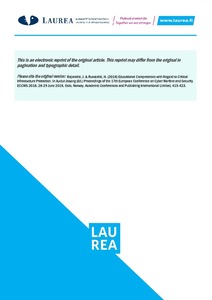Educational Competences with Regard to Critical Infrastucture Protection
Rajamäki, Jyri; Ruoslahti, Harri (2018)
Rajamäki, Jyri
Ruoslahti, Harri
Academic Conferences and Publishing International Limited
2018
Julkaisun pysyvä osoite on
https://urn.fi/URN:NBN:fi-fe2018083134372
https://urn.fi/URN:NBN:fi-fe2018083134372
Tiivistelmä
Current critical infrastructures can be considered cyber physical systems (CPS). CPS are a subset of sociotechnical systems that provide seamless integration between computational, human and physical elements. The National Academy of Sciences identifies four event management cycles that a system needs to maintain to be resilient: 1) Selfmodify/Plan/Prepare, 2) Absorb, 3) Recover, and 4) Adapt and learn. The Network-Centric Warfare doctrine identifies four domains that create shared situational awareness and inform decentralized decision-making: 1) Physical, 2) Information, 3) Cognitive, 4) Social. The research data of our case study is collected from authentic research and development projects (n=16) from three Finnish universities. Results indicate that future competences with regard to CPS are multidisciplinary including many industrial sectors and academic disciplines as well as multiple theories. Designing new curriculums and educational needs with regard to CPS, could benefit from the design science research (DSR) framework from Hevner and Chatterjee (2010). We have exploited the DSR framework for mapping future educational needs with regard to CPS and relevant industrial sectors and academic disciplines should be included. This paper argues that CPS education should, in all cases, cover both the four CPS domains (physical, information, cognitive and social) as well as all event management cycles(plan/prepare, absorb, recover and adapt). Traditional safety and security thinking has been based on the supposition that we can focus our actions in controlling our own systems and to stay inside a “circle of protection”. Thus, multi-stakeholder coordination and cooperation are needed, as no one actor alone can control complex large integrated cyber-physical systems of critical infrastructure. The focus of CPS education should thus also focus on cooperation and information sharing between the different different stakeholders. This is the way to promote more resilient complex systems of systems. Students need frameworks and models that enable resilience management across the entire network to maintain and improve critical functionalities.
